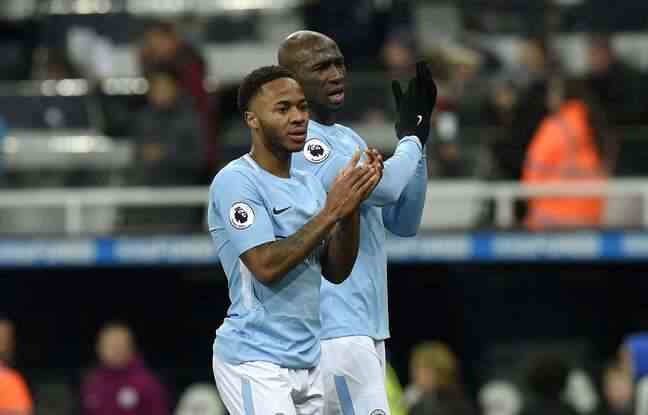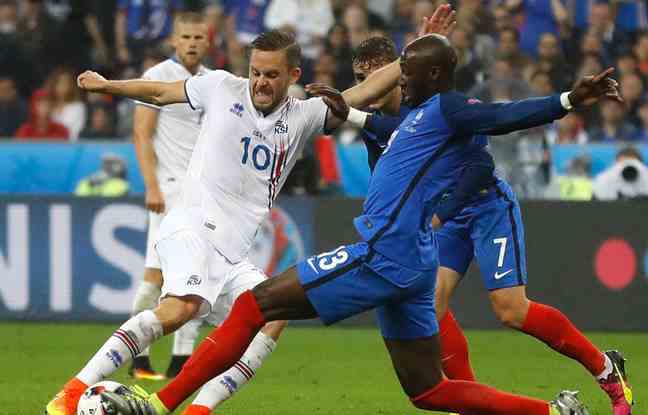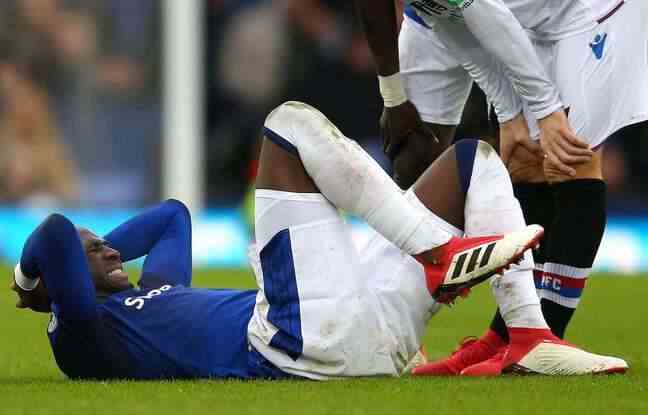At the ASSE training center in L’Etrat (Loire),
Seeing the former most expensive defender in the world land in January (for six months) in an AS Saint-Etienne bogged down in last place in Ligue 1 was not common. Held back by a serious right knee injury in 2018 and without a club since last summer, Eliaquim Mangala (31) is trying to help the Greens (18th) in their rescue mission in the top flight. Before the clash on Saturday (9 p.m.) against OM in a boiling Cauldron, 20 minutes met the tricolor international attacher (8 caps), who takes a sincere look at his transfer to Manchester City, his discussions with Pep Guardiola, but also his vision of a job that has changed profoundly in ten years.
You are French, born in Colombes (Hauts-de-Seine), and you had never played in the French championship until your signing for six months at ASSE this winter, at 31 years old. Was it an anomaly in your career?
I believe a lot in destiny and if it happened on this timing, it’s because life wanted it that way. Today I am in a historic club, with a great challenge. It would be sad for French heritage to see Saint-Etienne [actuel 18e en Ligue 1] come back down. When Loic [Perrin] called me to explain the mission to me, I was immediately hooked. And as soon as I arrived, I felt I was in the right place.
How do you view your career, from your first steps at AC Lustin (Belgium) to ASSE, via Standard de Liège, Porto, Manchester City and Valence?
I had the chance to play big competitions in big stadiums, it was my childhood dream. As a kid, when I was having fun in my garden, I sometimes imagined myself playing at the Stade de France. So wearing the France team jersey is really a dream that I realized there too. Looking back, I feel lucky and very proud of what I was able to accomplish.
How do you manage arriving at a club the size of Porto when you’re only 20?
I have always seen football thinking only of the pitch. So I was often detached from what was happening outside. All that mattered to me was training time and game time (smile). As soon as I was on the pitch, my whole world changed. The first year at Porto was complicated for me: I came from Standard where I was an indisputable starter and I started an apprenticeship. I quickly asked to be loaned out so that I could play. The sports director Antero Henrique told me to calm down, that I was in a year of transition to learn the language and a new style of play. Then I played a lot, I was champion of Portugal twice, and I participated in the 2014 World Cup. I had to channel myself, and it was this period that allowed me to explode.

To the point of becoming the most expensive defender in the world when he joined Manchester City in 2014 for an estimated sum of 53.8 million euros…
I did not consider that I was worth fifty million euros since no man is worth such a sum in my opinion. There was a supply and a demand, and a transaction was made. I always had this detachment, so even if it was speculating around the amount of this transfer, only what was happening with my teammates and the coaches mattered to me. It didn’t affect my game in any way. I remember that I immediately announced that a year or two later, my record would be broken. That’s what happened [avec son coéquipier John Stones, recruté par City pour 58 M€ en 2016].
Who says City says Pep Guardiola… Even if you mainly played for Manuel Pellegrini there (from 2014 to 2016), what did he bring you?
I first had the chance to meet him at the end of Euro 2016, before going on loan to Valencia. In one month, I saw things with him that I had never seen in the rest of my career. He showed us how to attack if a team pressed us with two or three attackers. He always explained to us why we were going to do things this way, and in great detail. But his way of presenting all game situations to us was so simple that it was amazing. All his simple little collective journeys took us to the last meters, and there he relied on the quality of the players. He repeated it to us: the most complicated thing, in football as in life, is to do simple things. Then after my return from Valencia in 2017, I had him for five months. This is where he brought me a great open-mindedness.
Is there Pep Guardiola in your tactical paw of “coach Mango” in “Football Manager”, which seems to be more than a hobby for you?
(Smile) Even if I don’t specifically take up his systems, yes, Pep Guardiola has an influence on me. In this game, I try to reproduce tactics that I can see in real life, and I try to understand the movements that can be put in place. I go beyond just playing Soccer Manager. Besides, my tactics will never be 4-3-3 or 4-4-2. If you see them one day, you will have a hard time understanding the pattern in which my team is evolving (smile).
Can you imagine becoming a coach in real life one day?
Yes, it is certain that I will graduate after my playing career.
You have realized your dream by counting 8 selections with the Blues. But Euro 2016 in France, during which you saw Adil Rami then Samuel Umtiti pass in front of you in central defense, isn’t it one of the big regrets of your career?
No, I see it as pure joy. I grew up in Belgium and several times in the youth categories, I was called to play for the Belgian selection. I always said no because I always wanted to play for France. And yet, at that time, no one knew that I existed in France (smile). So when you leave there and you’re selected for the 2014 World Cup in Brazil and Euro 2016 in France, you’re having a great group experience, and not everyone is so lucky. Of course, we all wanted to play because we are competitors. But the most important thing was group cohesion. It’s still human experiences with great moments, and those can’t be taken away from me.

Didn’t you still sometimes have the feeling of not being perceived at your fair value in France, both by Didier Deschamps and by the general public, like Aymeric Laporte after you?
No, Deschamps and his staff knew me very well, they watched all the matches. Afterwards, in the eyes of general public opinion perhaps, but that’s how it is. I had not gone through the French championship so I did not have this visibility with the French public. My destiny was made like that, I am not at all disappointed. The important thing is that I know my worth. Today, I am in France and people may discover me in this adventure with ASSE. My career is not over.
You regularly show your yoga sessions and the preparation of your own juices on social networks. Does all this have a significant place in your invisible preparation as a top athlete?
People separate the player from the human a lot. We are all human beings and beyond sports performance, well-being brings health, for body and mind. Everything is connected between the footballer and the human being. If as a man you feel better, you will be a better athlete. Sometimes there are super athletes that we feel out of step, humanly speaking, with the world of football. It creates conflicts and it prevents the athlete from making the most of his potential, as was the case for Yoann Gourcuff. He had crazy qualities but you could feel that as a man, he lacked personal fulfillment. I try to combine the two dimensions because I realized growing up that if I took care of my mind set [ma mentalité]I was going to better understand the moments when I was not doing so well.
Speaking of hard times, was there a before and after February 10, 2018 for you?
Yes, it’s the day of my right knee injury in the Everton-Crystal Palace game. It’s a bit from there that I learned that there was this human side that you can’t separate from the rest. Before that, I was very into performance, football, football, football (smile)… But life is more than that, even if football has always been my passion. It took me almost two years to come back and it remains the best victory of my career. My knee has become like my barometer. From there, I gave much more importance to details like yoga and nutrition.

Did all this personal approach allow you not to sink when you found yourself without a contract, from June to January?
Yes, I just assume that if it happens to me at this time, it can bring me something. It depends on how I look at this period. Everything that happens to me is either a blessing or a lesson.
Did you feel the curiosity of your young partners from Saint-Etienne when you saw an international arriving with your XXL CV?
Some may have asked me questions about my background. But today, young people sometimes have the feeling that they have already arrived, that they have already learned everything, because the media and social networks starify them quickly, in a good gesture or three good matches. The profession of footballer is much more difficult than that. And when they are a little less well, we no longer calculate them and we quickly move on to another player, which they do not understand. It’s not their fault, society is like that. Likewise, there are maybe five players over 30 in this locker room today. When I started professional football, it was the opposite, we were maybe four players under 23 in my team (smile).

